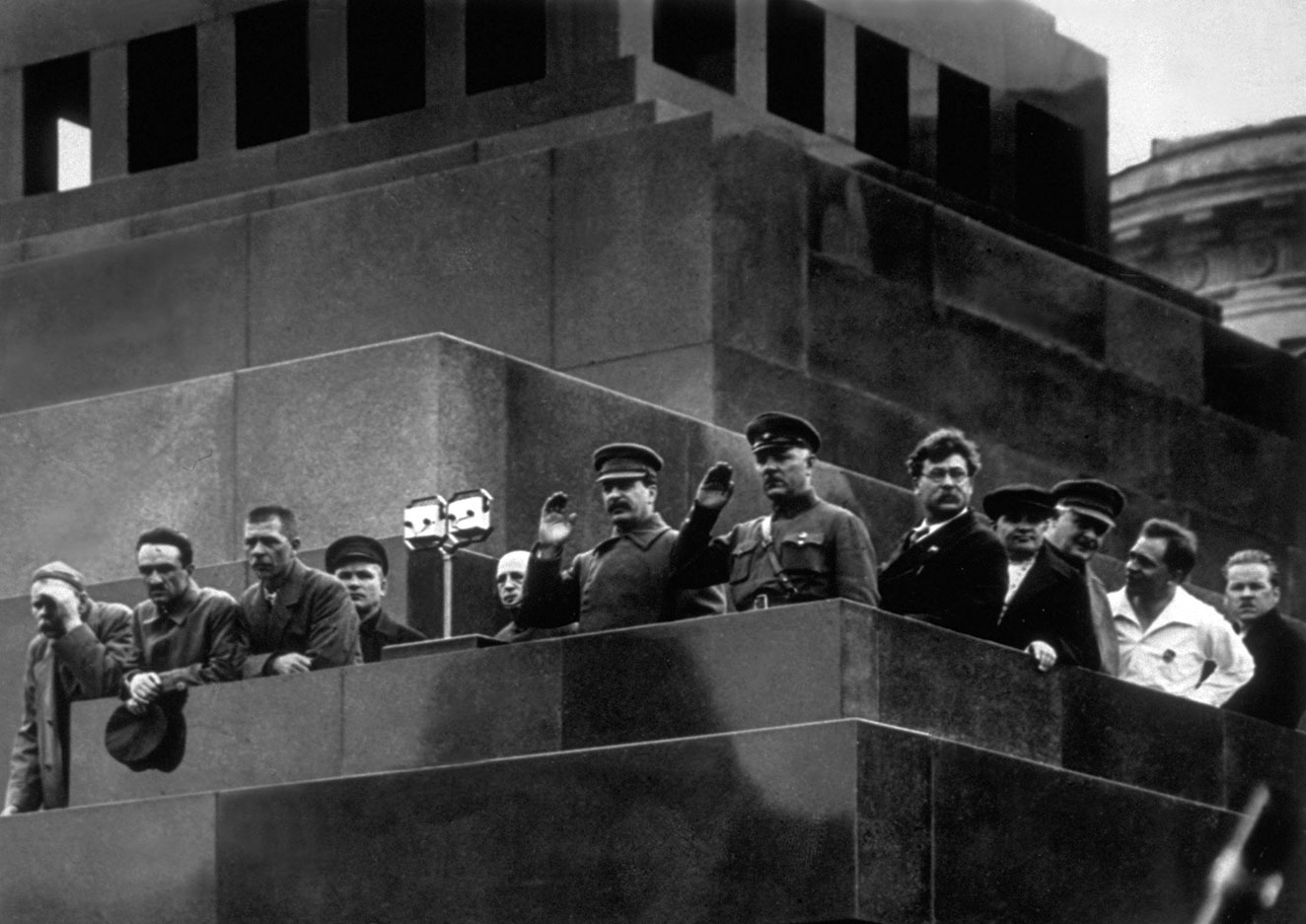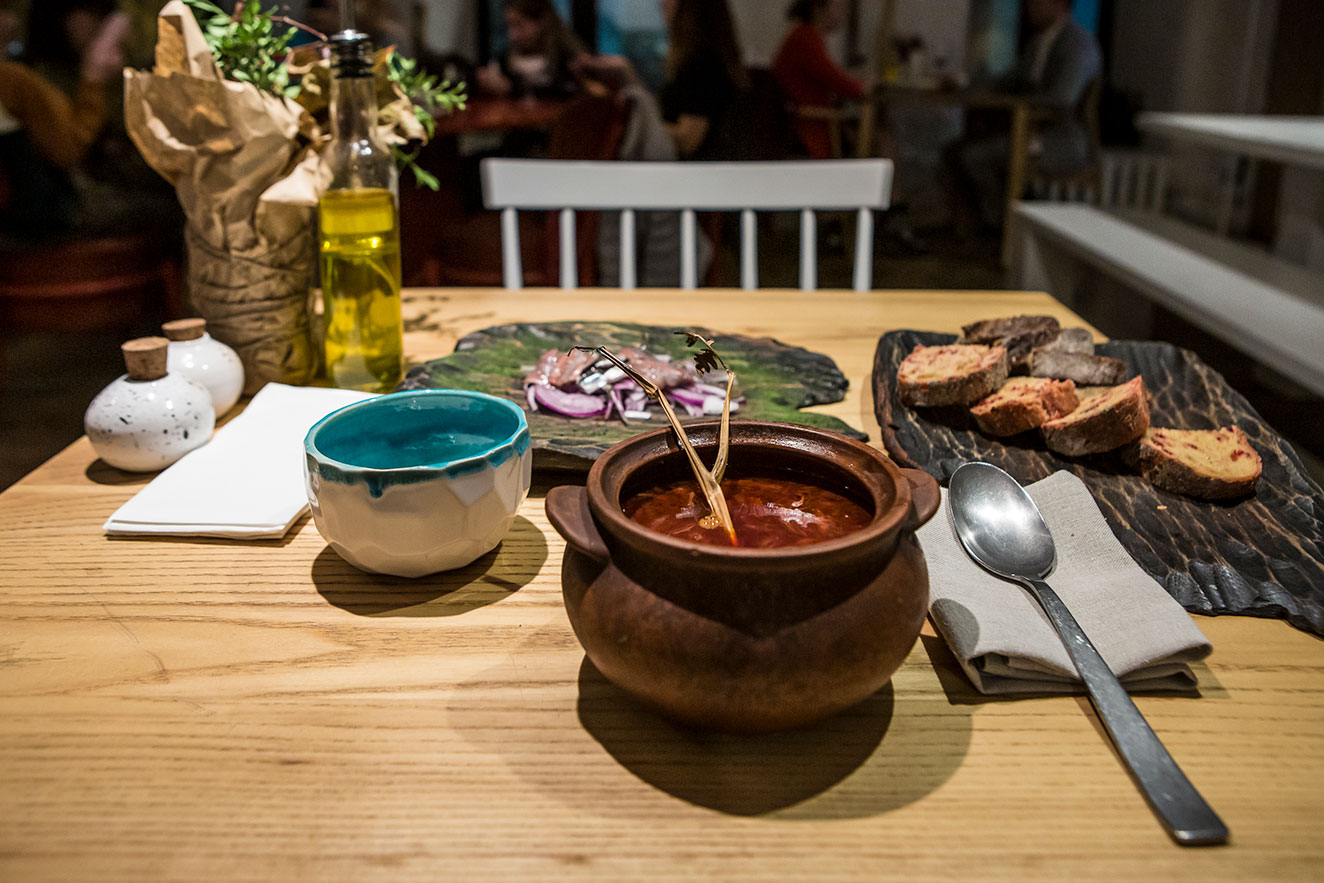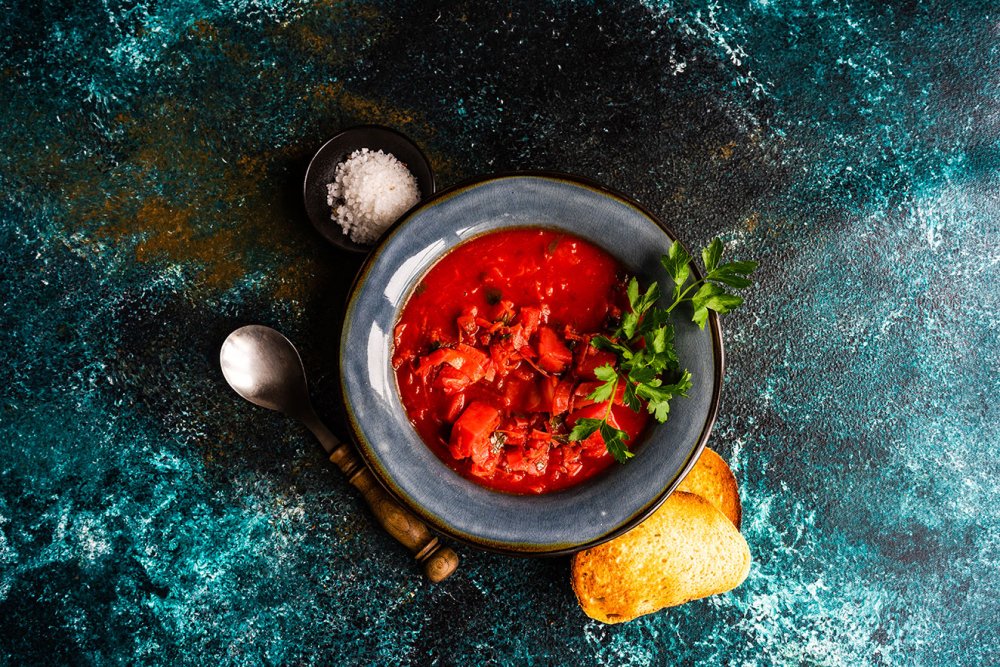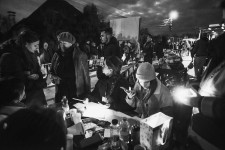Ukraine, April 2022. As missiles fell on the territory of Ukraine, under attack by the Russian Federation, an older grudge boiled in Russian hearts. A food that Russians, Ukrainians, Romanians and Poles all claim as their own - borscht - was back in the spotlight, after Maria Zaharova, director of the Russian Foreign Ministry's information and press department, accused Ukrainians of xenophobia, fascism and extremism for "not being willing to share the borscht recipe. It was supposed to belong to one people, one nation. They couldn't bear the thought that every housewife in the world could cook it her way. That's what it's all about."

Is that what this is all about? The fact is that, by that time, Ukraine already had an application submitted to UNESCO to register the "Ukrainian borscht-making culture" with the World Heritage List. And, while the application would have normally had to go through a lengthy procedure before being resolved, immediately after the outbreak of war, while evacuating the civilian population and strengthening their defences, the Ukrainians did not neglect borscht either. In fact, they stepped up their efforts to claim borscht preparation as a Ukrainian specialty. And with success, because on 1st of July, after an extraordinary meeting of the UNESCO committee, the culture of Ukrainian borscht making was included on the List of Intangible Cultural Heritage in Need of Urgent Protection.
For Russians and Ukrainians, the hot issue of borscht is not something new. The war over borscht has also boiled over in 2019, with Russia going on the offensive, according to the BBC, after the @Russia account (the official Twitter account of the Russian Ministry of Foreign Affairs) featured this post: "An ageless recipe, #Borsch is one of the most famous and appreciated dishes in Russia, and a symbol of traditional cuisine". Twitter users in Ukraine responded angrily to Russia's message with posts like the one below: "As if stealing Crimea from us wasn't enough, now you're stealing borscht from Ukraine".
Borscht on UNESCO’s plate
And, in November 2020, Yevhen Klopotenko, the owner of a famous restaurant in the centre of Kiev, launched the idea that Ukrainian borscht and the way it is cooked could be inscribed on the UNESCO World Heritage List. The chef took a pot of borsch to the Ukrainian Ministry of Culture to persuade officials to submit an official request to UNESCO to list borscht as an intangible part of Ukraine's cultural heritage. Klopotenko's borscht was convincing, so the Ukrainians submitted the application, hoping it would be considered by December 2021. Klopotenko set up a non-governmental organisation to gather evidence for his application to UNESCO and compiled 700 pages proving that borscht originated in Ukraine and is rooted in the country's culture.

Evidence that UNESCO's Intergovernmental Committee considered in its decision to accept the request to inscribe the culture of Ukrainian borsch cooking "as a case of extreme urgency" on the List of Intangible Cultural Heritage in Need of Urgent Safeguarding.
Then, last December, another chef, Yuri Kovryzhenko, was busy making borscht at the Ukrainian Embassy in London, prompting Johanna Mendelson Forman, an adjunct professor at American University's School of International Services and an expert on gastro-diplomacy and food as a peace-building tool, to note in her article entitled "How a national dish could become a symbol of Ukraine's struggle against Russia": "This iconic soup is central to Ukrainian identity. It is also at the heart of a culinary nationalism campaign that includes sending chefs around the world to promote Ukrainian cuisine. But not only was chef Yuri preparing borscht, he was also making a modern borscht with prunes, quince, duck and, of course, beetroot. Ukrainian diplomacy's new focus on gastro-diplomacy is simple: Conquer the hearts and minds of foodies around the world."
However, if you're wondering what makes Ukrainian borscht different from other peoples' borscht, you're not alone. A recently released documentary film on Netflix ("Borscht. The secret ingredient"), starring Yevhen Klopotenko, the chef who started the process of getting borsch listed as a UNESCO heritage site, shows his journey through several regions of Ukraine in search of the "secret ingredient" of Ukrainian borsch. He discovers that, depending on the region, or the influences of the people, Ukrainian borscht can be with red or white sugar beets, with pickled tomato paste, with fresh tomato sauce, or without tomatoes at all, with cabbage, with beans, with potatoes, with sausages or ribs, with beef bones or poultry meat, it can be spiced with cabbage juice, with vinegar, with a kind of buttermilk, it can be red, pink or purple, with or without mushrooms, and so on. The common element is the presence of this dish all over Ukraine and the fact that borscht brings people together around the table.

The UNESCO decision also conveys, through a clear statement, that "Ukrainian borscht is an expression of hospitality, bringing people of all ages, genders and backgrounds together around the table. It is also used in ritual practices, such as in the Podillia region, where the third day of the wedding has kept its ritual name do nevistky - na borshch, which means 'visit your daughter-in-law to eat borsch'. It is praised in stories, folk songs and proverbs and is considered a lifestyle and a marker of identity."
The reason why the practice of making Ukrainian borscht has been placed on the UNESCO emergency list is that "the viability of the element (making borscht) is threatened by various factors since the beginning of the armed conflict in February 2022, including the displacement of its carriers from their communities of origin and the cultural contexts necessary for cooking and eating borscht in Ukraine. In addition, the destruction of the environment and traditional agriculture has prevented communities from having access to local products, such as vegetables, necessary for the preparation of this dish."
Who cooked borscht first?
The video accompanying the decision to accept Ukraine's application to UNESCO also features Yevhen Klopotenko explaining that the first mention of Ukrainian borsch in historical sources dates back to 1552 and the first recipe for the dish is said to be found in a document from 1785.

Another culinary master, Olesia Lew, a New York chef and chief consultant for Veselka, a Ukrainian restaurant in New York City's East Village, states for BBC that "borscht did not simply slip through the collective consciousness of Russian cuisine, but most likely entered the Soviet mainstream in the Stalinist era as a result of a concerted effort by the Kremlin. In his attempt to collectivise the greatest country on Earth, Stalin tasked his food commissioner, Anastas Mikoyan, with establishing a Soviet national cuisine that would cater to the more than 100 different "nationalities" (the Soviet term for the various ethnic populations) inhabiting the USSR."
According to Olesia Lew, it was Mikoyan who, after a visit to the US, began to popularise efficient dishes such as kotleti (minced meatballs) in everyday Soviet cuisine. In 1939, Anastas Mikoyan published the Tasty and Healthy Food Book, a boilerplate cookbook that was often given by the Communist Party to newly married couples in the Soviet Union. "The cookbook made all these dishes part of Soviet culture and therefore 'Russian', as Russia was the most important culture for the Soviets," Lew says, as quoted by BBC.

But the author of the article also points out that in a Russian dictionary of Ukrainian words from 1823, borscht was defined as "the same as shchi" (ed. Russian borscht), while "a Russian etymology book from 1842 distinguishes between Russian shchi (referring the sour cabbage soup) and Ukrainian borscht, a word that actually refers to the traditional ingredient of soup, Bearberry (Heracleum sphondylium), a plant that grows throughout Eurasia, but flourishes in the marshy areas around the Danube and Dnipro (Dnepr in Russian) river deltas'. And that, in fact, "long before the existence of today's Russia or Ukraine, people in the Black Sea region boiled soup from the stems, leaves and flowers pickled in bear's brine. Recipe books show that Ukrainians added red beetroot".
Furthermore, the UNESCO Committee, in last year's decision, also recorded that it "also takes note of the fact that the culture of borscht cooking is shared with other communities in the region and recalls that the inscription of an item on a Convention list does not imply exclusivity or ownership". And Ukraine will have to revise the plan to protect Ukrainian borscht cooking culture in the light of the changing geo-political context, with adjustments to the borscht protection plan to be discussed again later this year.

Speaking of gastro-diplomacy, the role that food can play in portraying a nation's identity, expert Johanna Mendelson Forman points out how in 2021, when Michelin published its 2021 Guide to Moscow Restaurants, it highlighted "the iconic national dishes of Russian cuisine - borscht and pickles". The Guide's press release prompted the Ukrainian ambassador to France to protest, and Michelin apologised for "gastronomic imprudence with unexpected political overtones". No wonder Ukraine's news last year about one of its housewives shooting down a Russian Federation drone with a jar of pickles (!!!) was greeted with great enthusiasm as a brief victory at a time when Ukraine needed as many supporters as possible.

















